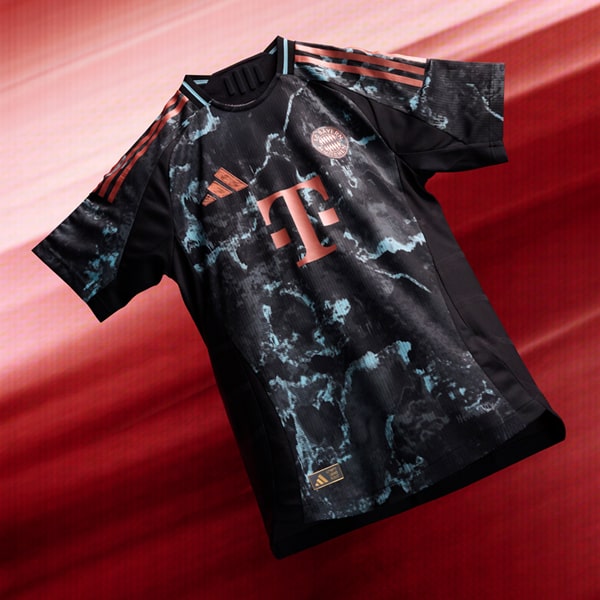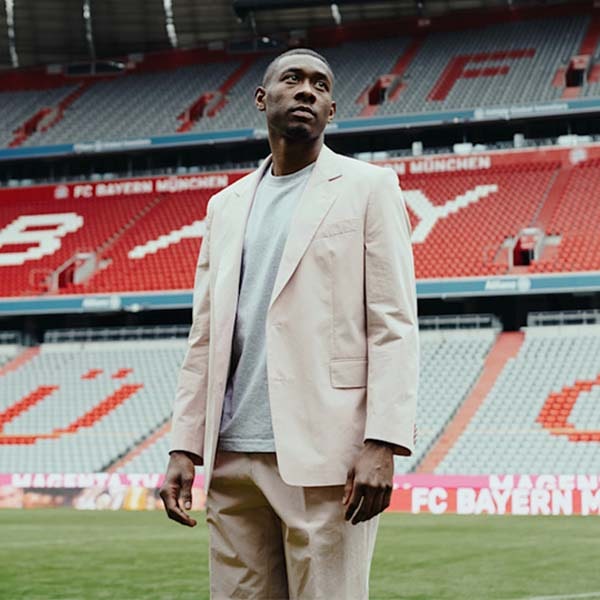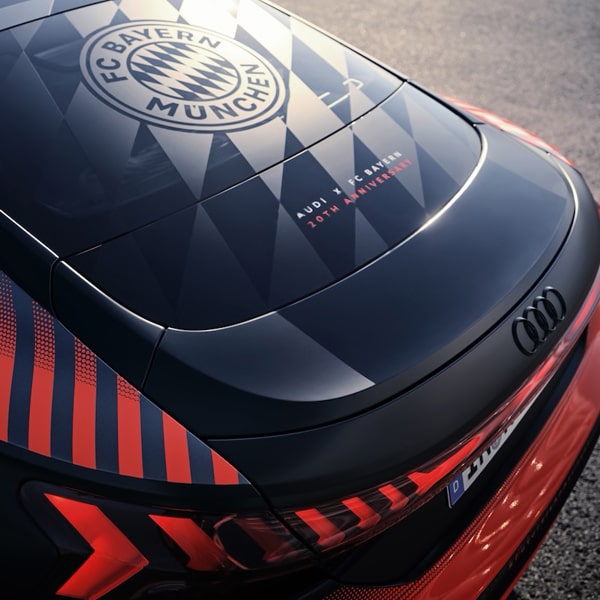Taking to the streets of Miami in company with FC Bayern Munich, Audi and none other than Giovane Élber.
Framed by the high-energy buzz of the Club World Cup and rooted in the cultural fabric of Miami, we hit the streets with FC Bayern and Audi to explore the deeper threads of the game — where football meets lifestyle, and legacy rolls on four electric wheels. In the driver’s seat of an Audi RS e-tron GT Performance concept wrapped in Bayern DNA, Giovane Élber — a legend of both Brazil and Bavaria — showed us what it means to carry football with you everywhere, even long after the final whistle.
From quiet conversations about identity to raucous reflections on fans who'd sell their fridge to follow their club, Élber moves through the city like he did the pitch: with purpose, joy, and style. In a world where football is more than just 90 minutes — it's music, fashion, movement, meaning — Élber’s journey speaks to the culture we live for. This isn’t about nostalgia. It’s about understanding where the game has been, where it’s going, and how it lives in the streets between.
You played in Brazil, Switzerland, Germany, and France. How would you describe the football culture in each of those countries?
Every country I played in taught me something new. In Switzerland, I became an adult – I moved there at 19 with no parents by my side, and I had to learn everything on my own. It was a big step.
When I moved to Germany – first Stuttgart, then Bayern – I was already familiar with the language thanks to my time in Switzerland, so the transition was easier for me and my family.
France came at the end of my career. I had the chance to learn a new language and meet new people and fans.
Fan culture varied a lot: Swiss fans were calm but kind, always there for us. In Germany, it was more intense – fans would travel with us, even fly with the team. And in France, they were even louder – more passionate in the stands. It was beautiful to experience how differently fans live football from one country to another.
What impact did moving from Brazil to Europe have on you as a person?
It changed me massively. I learned new languages, new mentalities. When you stay in one country, you only see one perspective – but the world is huge, and there’s so much to learn from others. That experience shaped me. Now, wherever I go, I feel at home. I understand people better because of what I’ve lived.
And how did all that influence your football?
We always say – and I say it often as an ambassador for Bayern – football brings people together. When I travel, even to remote places in Asia, I meet Bayern fans who tell me they started learning German just to one day visit Munich and watch a game. That’s football – it creates dreams, builds bridges. Other sports might bring people together too, but football? It’s on another level.
Looking at the Club World Cup, how do you see its role in connecting continents through football?
It’s powerful. In some stadiums, fans are quiet – they just want to watch the game. But South American fans? They start the party four, five days before. They make noise in the streets, in the stands – football is religion for them. I met people in Miami who sold fridges, windows, whatever they had – just to be here. It’s not just a game to them. It’s love. It’s life. They don’t think about tomorrow – they’re here, now, living their dream.
What do you think is the potential of the Club World Cup?
It’s huge. Clubs from all over the world get to experience each other’s styles and mentalities.
I had never seen a team from New Zealand play, but then Bayern faced Auckland City. Sure, they were amateurs, but for them? That match was like Christmas. Imagine sharing the pitch with Harry Kane, Manuel Neuer, Thomas Müller. That’s usually only possible in Europe or the Champions League – but the Club World Cup brings it to more people, more places.
It shows that football is global, and no one needs to feel less than. A club from Brazil can be just as strong as Chelsea, Bayern, or PSG.
What’s the atmosphere been like here in Miami? Have you felt that energy from the fans?
Absolutely. I’ve been here ten days and met fans every single day. It feels like a regular World Cup. There are fans not just of the clubs playing, but from all over – they’ve travelled just to experience it. That says a lot. They’re already thinking about next year’s World Cup and what it’ll be like. It’s a global celebration.
Looking back on your playing days, what made you stand out during your prime?
I always respected my opponents – that was important to me. And I learned to stay human. Win or lose, it’s part of life. Football teaches you that – to deal with both sides of success and failure. And that’s something I’ve carried with me beyond the game.
Nowadays, players express themselves through fashion, music, and social media. How do you view that shift in culture?
It’s a different generation. Back in my day, we just wanted to celebrate a goal with a dance, something for the fans to enjoy. Remember Miroslav Klose’s somersault? You don’t see that kind of celebration as often now. But I respect how the new generation does it – they’re different, and that’s okay.
What advice would you give to today’s players?
Enjoy every moment. Football doesn’t last forever. One thing I learned early on: don’t let the footballer come before the person. The player fades – the person remains. Respect others, give your best, and understand how short this time is – especially at big clubs like Bayern. There’s no time to waste.
If you could play today, in any team, city, or culture – where would it be?
May I say Bayern Munich? Munich is home. I spent six incredible years there – I wish it had been longer. What I learned from that club, from Uli Hoeneß, Karl-Heinz Rummenigge, Franz Beckenbauer – it was a dream. Sitting at a table with them, with Gerd Müller… that’s unforgettable. For me, there’s only one club: Bayern Munich.
Now we’re in Miami – how has this experience felt for you?
I didn’t expect this level of energy – not like South America or Europe. But with so many international fans here, the vibe is amazing. Against Boca Juniors, their fans were incredible – singing nonstop until the final whistle. That gives me hope for next year’s World Cup. Hopefully, American fans catch that energy and bring it into their stadiums. The Germans and Europeans already know how to do it – now it’s America’s time.
You’ve been driving around Miami in an Audi wrapped in Bayern graphics. How does that feel – bringing the club’s identity into the city like that?
Audi and Bayern have been partners for years, but it’s more than just business – it’s family.
I know many people at Audi personally. When we meet in hotels, it’s like seeing friends, not colleagues. Driving the e-tron GT through Miami with the Bayern badge? Not many people get to do that. People look at the car, then they see me inside – it’s a great feeling.
And when you see the Bayern logo in unexpected places – like on a car – what does that mean to you?
It’s like seeing a piece of my family. When I see someone in a Bayern shirt – even here in Miami – there’s an instant connection. That’s what I try to pass on as a Bayern ambassador: the feeling that we’re one big family, always there for each other.
If you had to pick a soundtrack for your drive through Miami, what would it be?
It’d have to be Latin music. You feel it everywhere in this city – the Cuban and South American energy. When I walk into a place and hear salsa or rumba, I just want to start dancing. It’s beautiful.
Photography by Daniel Zuliani and SoccerBible.

















